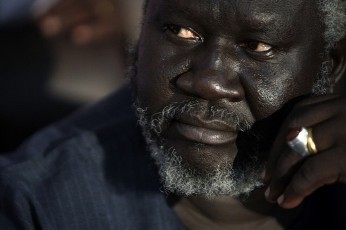Border state governor says ‘mismanagement’ led to South Sudan split
August 15, 2011 (KHARTOUM) – Chronic mismanagement is a major factor behind South Sudan’s split from the north, according to the governor of a northern state abutting the south.

Malik Aggar, governor of Sudan’s southern state of Blue Nile which lies on the ill-defined borders with the South, on Sunday addressed a farewell ceremony of 201 southern employers in his state’s capital Al-Damazin.
In his speech, Aggar said that mismanagement in Sudan was a major reason for the south’s split.
“Secession was caused by the policy of intolerance,” he added.
Aggar, who chairs the northern offshoot of Sudan People’s Liberation Movement (SPLM) which rules the south, advised the southerners to “adopt the beautiful things from the north and refrain from intolerance.”
The Blue Nile State lies inside the north but it shared political and military struggle with the south. The state’s population largely sided with the south during the civil war with the north on basis of common grievances of neglect and underdevelopment.
Aggar expressed his dissatisfaction with the south’s secession but he later said he was optimistic the two countries could reunite. He added that the south’s resources could reflect positively on the level of development if these resources were to be used judiciously.
According to Aggar, problems occur in the south due to the lack of education
Under the CPA, Blue Nile State and South Kordofan were promised a plebiscite dubbed “popular consultation” in order to gauge local satisfaction with the agreement’s implementation and produce recommendations on re-structuring governance relationship with the north.
However, the popular consultation in Blue Nile stalled as South Kordofan descended into a state of war between the northern army and forces aligned with the south since early June.
Aggar lamented the fate of the “dying” popular consultation process. He pointed out that the vote was supposed to take place within the CPA’s six-year transitional period, adding that the transitional period has not been extended.
Sudan’s parliament last month endorsed a bill extending the popular consultation process by six months after its deadline expired with the end of the CPA in July.
Aggar previously warned that approving the law would be a violation of the CPA and that he would not recognize it.
He called on the citizens to “resist the unjust and oppressive law which was passed by a single party that represents no one but itself,” in reference to the ruling National Congress Party in the north.
(ST)
